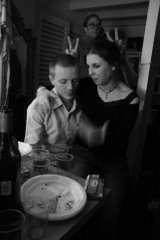A small part of history by Peggy Elliott
In a nutshell : In 1846, the extended Springer family join the Oregon trail - a collection of 20+ families who decide to go westwards from Missouri to start a new life in Oregon. Written from the point of the view of the women on the trail we follow the hardships they encounter as their wagons cover over a thousand miles of inhospitable lands, with all the trials one can imagine on the way.
The blurb : This book, which was inspired by a book called "Women's diaries of the westward journey" by Lillian Schlissel, is written exclusively through the eyes of the women who followed their men on these incredible westward journeys. Through first person narrative, diary extracts and third person omniscient narrative we are given an account of the journey that is more concerned with the practicalities of keeping families together -and alive- rather than the technical aspects of the trail. A sticker on my edition says "guaranteed to break your heart" and the huge difficulties accompanied by the massive deathtoll of those involved remind us of the truer story of the romanticised "pioneer 'n eldorado" accounts of the trails to the Pacific.
IMHO, this is a very interesting, albeit very chick-litt and sentimental novel. For those interested in the 19th century conquest of the American west, this women's account of an often male-angled part of history, is fascinating. The main interests of this book are seeing the neat separation of men and women's roles in society and in the household, and the gruesome realities of the trail: pregnancy, accidents, illness, friendships through necessity, grim conditions and so on make it run like a soap opera. That said, it reads well and the level of detail is captivating : despite being fiction this author has done her research and we imagine travelling alongside the wagons through the plains, lava deserts and mountains. This book is good for people who would like to read an adult version of "The long winter" by Laura Ingalls Wilder, who like this historical period and, though I hate to say it, are female.
Inscription à :
Publier les commentaires (Atom)



Aucun commentaire:
Enregistrer un commentaire